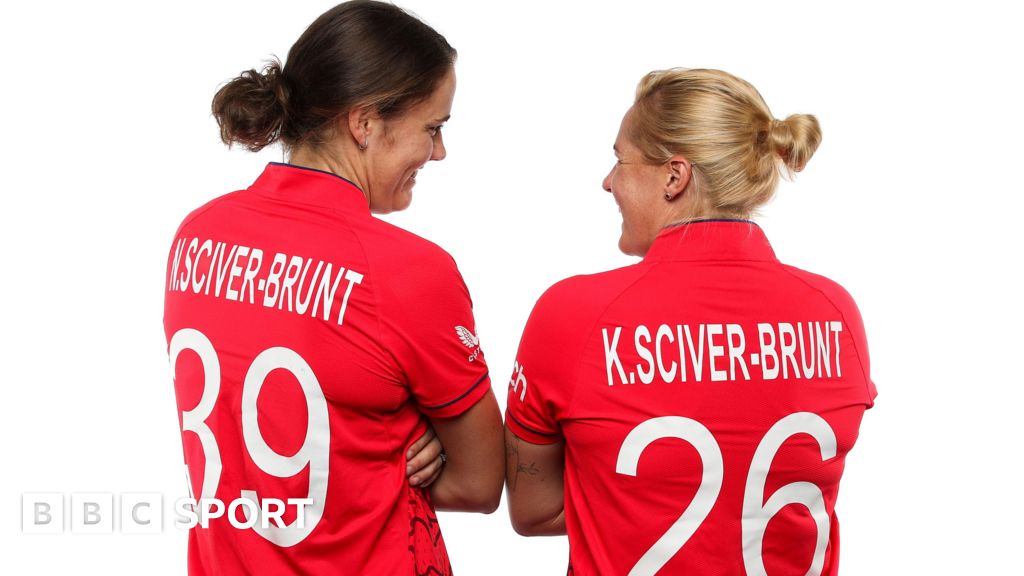Cricket
Nat Sciver-Brunt on egg-freezing, England captaincy and rainbow laces – BBC Sport

- Author, Stephan Shemilt
- Role, Chief Cricket Writer
There was a time when Nat Sciver-Brunt wouldn’t have wanted to talk like this, especially not to the media.
“I haven’t always felt comfortable doing interviews, let alone talking about me. It’s been a bit of a journey with that,” she tells BBC Sport.
But talking about herself is something that has become important, if not to Sciver-Brunt herself, then to those who see the England all-rounder and Wisden’s leading women’s cricketer in the world as a trailblazer, inspiration and role model.
This particular conversation starts with cricket’s Rainbow Laces campaign, beginning on Sunday at England’s second one-day international against New Zealand in Worcester – the series gets under way in Chester-le-Street on Wednesday.
For Sciver-Brunt, it comes just over a month after she and wife Katherine, the former England fast bowler, went public with their plans to start a family together.
“It’s a time to talk more about the LGBTQ+ community in cricket and in general,” says Sciver-Brunt.
“It allows conversations to be had. Our cricket team is inclusive and welcoming, but also the work that needs to be done everywhere.”
Sciver-Brunt says being open about the egg-freezing treatment she has undergone is a “stage on” from publicly coming out. She and Katherine announced their engagement in October 2019 and got married in 2022.
When Nat missed the first T20 against Pakistan last month it was initially attributed to a “minor medical procedure”, before the couple discussed the beginning of their fertility journey on Katherine’s Under The Lid podcast.
“I don’t feel the need to hide anything,” says Nat. “Generally, women’s health and fertility is not really spoken about that much.
“I could have just spoken to my team-mates about it and, in public, not tell the whole truth about why I missed a game, but I couldn’t be bothered with the admin of remembering what to say.
“It’s a great thing to talk about. Cricket isn’t forever and prioritising things is important.”
Nat will be 32 in August. Rather than take a break from cricket to have a baby, she says the next stage of the process will not begin until she ends her career, with the sport’s return to the Olympics in 2028 among the targets she is aiming for.
Katherine, who is 39 next week and retired last summer, has previously said that she has a “fertility journey to go through”.
“She has tried to sound like she didn’t want to have kids,” says Nat. “The reality is she has had baby names on her phone for a long time.”
The opportunity for Nat to go undergo fertility treatment is partly made possible by the ever-changing landscape of women’s sport, not just through the understanding of employers, but the greater financial rewards on offer.
Bought for about £320,000 by Mumbai Indians in the Women’s Premier League (WPL) auction of 2023, Sciver-Brunt is one of the highest-paid female athletes in the UK.
Earlier this year, when some of England’s tour of New Zealand clashed with the end of the WPL, Sciver-Brunt said money was a “factor” in her decision to remain in India.
Though she says by that point the “wheels were in motion” for the expensive egg-freezing procedure, she acknowledges there would have been a time in the fairly recent past that such a decision would have required significant financial planning.
The Sciver-Brunts, then Nat Sciver and Katherine Brunt, were once landlords in Loughbrough to three other England team-mates – Amy Jones, Fran Wilson and Beth Langston. With international players then on one-year contracts, Nat can recall asking the England and Wales Cricket Board for help with proof of future earnings to support mortgage applications.
Clashes between franchise leagues and international cricket are set to become more regular. Later this year, the Women’s Big Bash in Australia will be squeezed between the T20 World Cup and England’s tour of South Africa. England are yet to reveal how they plan to navigate the overlap, but Sciver-Brunt, who played for Perth Scorchers last season, says the Big Bash is “not a thing” for her in 2024.
Image source, Getty Images
Even without the BBL, Sciver-Brunt is about to embark on a relentless schedule.
The series against New Zealand will be followed by The Hundred, after which comes the T20 World Cup in Bangladesh. The tour of South Africa includes a Test that will aid preparations for the Women’s Ashes in Australia in early 2025, then the 50-over World Cup takes place in India later next year.
In 2022, Sciver-Brunt took a break from the game to focus on her mental health, following a similarly hectic period when she also captained England at the Commonwealth Games in place of the injured Heather Knight.
Now, Sciver-Brunt says she knows “more about her herself” and, as England vice-captain, says she would be interested in the job full-time at some point in the future. She is almost two years younger than Knight, who took charge all the way back in 2016.
“I’ve got a lot of learning to do about what that actually entails,” says Sciver-Brunt. “From the outside it can seem like you’re answering a few questions in the media and making decisions on the pitch.
“There’s a lot of other stuff that goes into it, so I’ve got a fair bit of learning to do before that happens.”
The England captaincy and a family are potentially in Sciver-Brunt’s future, but first comes tying the rainbow laces in her boots.


)






